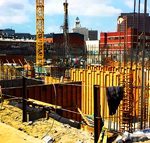The U.S. Supreme Court has ruled that California developers and home builders may challenge impact fees imposed by cities and counties for roads, bridges and more.
The justices said the fees may be unconstitutional if builders and developers are forced to pay an unfair share of the cost of public projects, the Los Angeles Times reported.
In the landmark case, a 72-year-old retiree from Placerville, George Sheetz, took on El Dorado County over a $23,420 building fee, raising questions about the justification of “impact fees” imposed on new construction projects.
The outcome of the case could have major repercussions for local government budgets and housing markets, especially in the Golden State.
But the justices didn’t set a rule for deciding when such fees become unfair and unconstitutional.
Developers contended that limiting California’s high fees for new construction would lead to more affordable housing. California state courts had blocked such claims.
But the 9-0 Supreme Court decision opened the door for such challenges. The justices revived a constitutional claim brought by Sheetz, who put a manufactured home on a small lot and was told he would have to pay the $23,420 “traffic mitigation fee.”
Justices Sonia Sotomayor and Ketanji Brown Jackson said they joined the court’s opinion in Sheetz vs. El Dorado County because it was limited to allowing such challenges.
In a separate opinion, Justice Brett Kavanaugh said he saw merit to the “common government practice of imposing permit conditions, such as impact fees, on new development through reasonable formulas or schedules that assess the impact of classes of development rather than the impact of specific parcels of property.”
State and county attorneys made just that argument. They said it was fairer to impose a development fee on all the lots in an area.
But the justices nonetheless ruled that homeowners or developers may sue to challenge these fees as an unconstitutional taking of their private property.
The Pacific Legal Foundation in Sacramento, which supported Sheetz, hailed the ruling as a significant victory for property rights.
The case will now go back to the California courts.
Attorney Paul Beard, who represented Sheetz, said the “fee must be set aside as an unconstitutional taking, because the county has failed to show — and cannot show — that the fee is sufficiently related and proportionate to the traffic impacts of Mr. Sheetz’s modest home.”
The debate over development fees is especially relevant in California as local governments have increasingly relied on the charges to finance parks, streets, schools and other infrastructure and services in the decades after the passage of Proposition 13 in 1978 limited property tax revenues, according to the Times.
The fees have come under scrutiny as developers and others have blamed them for driving up the cost of housing and for wide disparities between cities.
A 2018 study by UC Berkeley’s Terner Center for Housing Innovation found that fees for new single-family homes in California range from $21,000 to $157,000 per home, accounting for 6 to 18 percent of the price of a typical home, depending on the location.
— Dana Bartholomew
Read more



